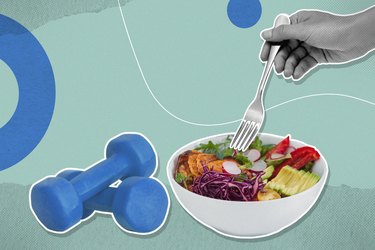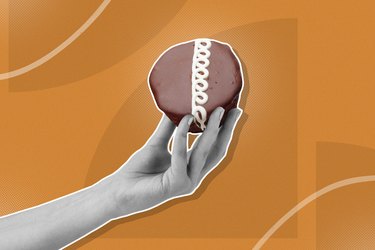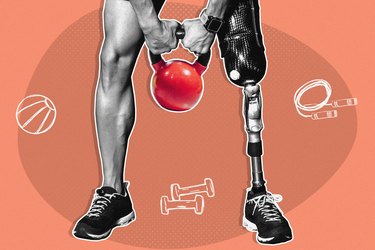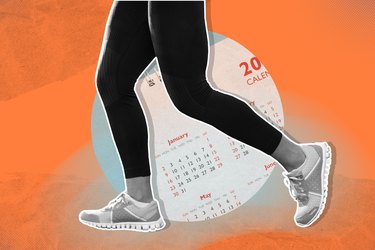
You probably don't need anyone to tell you that diet and exercise are good for you. It's pretty much the same advice that's been given since the days of ancient Greece.
The benefits of how a nutritious diet and exercise can benefit all of you — body and mind — get lost in diet culture, where the focus is far too often is simply on weight. Here's what happens to your body when you start pairing good nutrition with exercise (hint: it's all good!).
Video of the Day
Video of the Day
Your Heart Health Will Improve
One of the first signs that your heart may be in danger is developing high blood pressure — and that's something you want to stop in its tracks when you see it creeping up. Why? The strain from high blood pressure can lead to atherosclerosis, which can cause a heart attack, per the American Heart Association (AHA).
The AHA calls high blood pressure the "silent killer" because it often goes undetected for long periods of time before it's caught. Normal blood pressure is under 120/80mm Hg for adults, so get yours checked to see where your numbers are.
So, how do diet and exercise help? Some folks with high blood pressure have a genetic predisposition to it, but that doesn't mean you can't do anything about it. Diet plays an important role in preventing and treating high blood pressure. A diet high in processed foods is often high in sodium and that excess sodium may be partly responsible for raising your blood pressure.
You can do a couple of things to get rid of this risk factor. The first: Change your diet. The DASH (Dietary Approaches to Stop Hypertension) diet is a specialized eating plan that cuts your sodium back to no more than 2,300 milligrams per day, according to the National Institutes of Health. It focuses on fruits, vegetables, lean proteins, whole grains, and low-fat dairy. This large amount of fruits and vegetables isn't just about getting you to eat your broccoli, it actually has a clinical significance.
You see, most fruits and vegetables are sources of potassium. Potassium helps your body release sodium and can help ease the tension in your blood vessels, according to the AHA. This naturally helps lower your blood pressure.
Exercise also helps to take that blood pressure down by naturally releasing nitric oxide. Nitric oxide is known as a vasodilator, which means it opens up your blood vessels, helping blood to flow more freely and this helps lower your blood pressure, according to Harvard Health Publishing.
Your Blood Sugar Might Drop
If you have high blood sugar, or pre-diabetes, you have probably been told that exercise is good for blood sugar control. That's absolutely true. The American Diabetes Association states that exercise can help lower your blood sugar for 24 hours or more after exercise by making your body more sensitive to insulin.
So, how does this work exactly? When you exercise, whether you have high blood sugar or not, you have transporter proteins in your body called GLUT4. These glucose transporters help move glucose out of the blood and into the cells to be used for energy. Increasing GLUT4 in the body can help improve, and in some cases even reverse, type 2 diabetes, per a May 2022 StatPearls report.
Let's not forget about the role of diet in keeping blood sugar under control. A diet rich in fruits, vegetables, lean proteins, dairy and whole grains can give you enough fiber and protein to help keep blood sugar spikes at bay. The Academy of Nutrition and Dietetics recommends getting 14 grams of fiber per every 1,000 calories you eat per day.
Foods high in fiber and/or protein are digested and absorbed slower, which helps to regulate blood sugar levels, according to the Academy of Nutrition and Dietetics.
You Might Lose Weight
Obviously, one reason to get out there and hit the pavement and eat nutritiously is to maintain a healthy weight and prevent or overcome obesity. According to the Centers for Disease Control and Prevention (CDC), some of the health consequences of obesity include:
- High blood pressure
- Heart disease
- Type 2 diabetes
- Stroke
- Osteoarthritis
- Gallbladder disease
- Sleep apnea
- Low quality of life
Losing weight won't solve all of your problems, but it might keep you from developing one or more of these conditions if you have overweight or obesity. The key to preventing many of these conditions is diet and exercise.
You may hear that one or the other — diet or exercise— will independently help you lose weight. In some cases, this may work, but the results are even more pronounced and accelerated when done together.
Your Gut Health Will Improve
You are the host to a vast array of microorganisms in your gut working hard to keep you healthy. That world inside your gut is known as the microbiome, and what you eat has a lot to do with the health of your gut.
The Western diet — which is characterized by a diet high in added sugars, saturated fats and sodium — is disruptive of the healthy balance of bacteria in the gut, which can leave you susceptible to illness, according to a study published in the journal Nutrients in August of 2019.
Changing the way you eat — and focusing on the amount of fiber you eat in a day — could help restore the balance in your gut.
Now, what's really interesting is that exercise seems to do the same thing for the gut. Exercise helps reduce inflammation in the gut and promotes greater bacteria diversity, both of which promote a healthy microbiome, according to March 2017 research in Oxidative Medicine and Cellular Longevity.
You'll Have More Energy
Feeling sluggish all the time can be the first indicator that something is wrong with your diet. In fact, there are certain elements in your diet that can steal your energy and others that can put the pep back in your step.
Not having enough water in your diet is sure to give you a little fatigue. Water is essential to keep your energy high and a huge part of a nutritious diet, per Harvard Health Publishing. In addition, crash dieting or fad diets that exclude entire food groups may be robbing you of much-needed nutrients, which can zap your energy. Keeping variety in your diet with food from all food groups ensures that you meet nutrient requirements, especially for iron and B vitamins.
Now, when you pair the improvements in your diet with a little daily exercise, you might feel like you can conquer the world (or just get through the workday without feeling tired). Harvard Health Publishing suggests exercise for fatigue because it boosts dopamine, serotonin and norepinephrine in your brain, which all give you energy.
Also, as your body gets stronger from exercise, it becomes more efficient and takes less energy to do smaller tasks, so you won't tire out as easily. That saves energy for that after-dinner stroll.
Your Mental Health Might Look Up
Your mental health is just as important as your physical health, and diet and exercise play more of a role than you might think.
According to a September 2018 study in The Lancet Psychiatry, those who exercised had fewer days of poor mental health than those who did not exercise. The researchers found this association with exercising just three to five times per week with team sports, cycling and going to the gym.
Some of the issues related to poor mental health include inflammation and poor gut health, according to April 2019 review study in Psychosomatic Medicine. Some of the nutrients mentioned in the study with the potential to benefit those pathways in the body include:
- Omega-3 fatty acids: found in fatty fish, walnuts, flaxseeds
- B vitamins: found in whole grains, fruits, vegetables
- Magnesium: found in almonds, seeds, spinach
- Fiber: found in fruits, vegetables, whole grains
- Probiotics: found in yogurt, sauerkraut, kimchi
How to Get Started
So you're ready to start eating more nutritiously and exercising — the health benefits speak for themselves.
Before you start an exercise program, you should always check with your doctor to make sure you can start your preferred exercise program. Then, seek out a personal trainer or certified strength and conditioning specialist to help guide you until you're comfortable enough to take the reins on your own.
If diet is where you need help, ask for a referral for a registered dietitian (RD) who can help evaluate the way you eat and see where you need to make changes. An RD can help you create a meal plan that delivers all the nutrients you need to help you reach your goals.
- American Heart Association: "How High Blood Pressure Can Lead to a Heart Attack"
- Harvard Medical School: "Exercise and Your Arteries"
- American Diabetes Association: "Blood Glucose and Exercise"
- NCBI: "Physiology, Glucose Transporter Type 4 (GLUT4)"
- Academy of Nutrition and Dietetics: "What is Glycemic Index?"
- Harvard Medical School: "Eating to Boost Energy"
- The Lancet Psychiatry: "Association between Physical Exercise and Mental Health in 1·2 Million Individuals in the USA Between 2011 and 2015: A Cross-Sectional Study"
- Harvard Medical School: "Refueling Your Energy Levels"
- Academy of Nutrition and Dietetics: "Fiber"
- Oxidative Medicine and Cellular Longevity: "Exercise Modifies the Gut Microbiota with Positive Health Effects"
- National Institutes of Health: "DASH Eating Plan"
- Psychosomatic Medicine: "The Effects of Dietary Improvement on Symptoms of Depression and Anxiety: A Meta-Analysis of Randomized Controlled Trials"
- Nutrients: "Diet and Immune Function"



